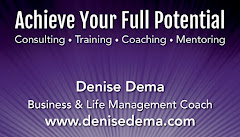Personal
integrity is the quality of being honest with yourself and others, and living a
life that is aligned with your moral principles. Developing personal integrity
requires examining your beliefs and value system, and taking conscious steps to
behave in ways that are consistent with your personal moral code. Here are some
ways to develop personal integrity.
- Identify aspects of your behavior that require change. Reflect on your interactions with others in the workplace, at home and in social situations to determine specific areas in need of improvement. For example, if you are late for work every day and feel guilty about creating excuses for this behavior, this may be an opportunity to develop greater personal integrity.
- Determine your reasons for not behaving with greater personal integrity. For example, you may be pushing unpleasant work tasks on to other employees instead of being honest with your boss about your inability to do the tasks. You may be afraid to admit to yourself or to your boss that you do not possess the right skills or that the job is not the right fit for you.
- Face the obstacles that cause you to lie or violate your moral code. This might involve finding a more suitable job, facing your fears about how others may perceive you and/or seeking out counseling to address emotional challenges and insecurities.
- Practice truthfulness. Consider all of the relationships at home and work that will benefit from greater truthfulness. For example, if managing a team of employees, be honest and direct with each individual about your expectations and employee performance. Avoid backbiting or gossiping. Refrain from causing harm. Part of developing personal integrity is gauging when and how to deliver the truth. Be careful not to confuse truthfulness with anger-driven and brutally honest confrontation.
- Make a list of tasks and behaviors in which you will become more trustworthy. The list might range from basic tasks, such as taking out the trash as promised to repaying large sums of money in a timely manner.
- Respect the property of others. Consider any complaints you may have received in the past about using another person's belongings, parking in someone else's parking spot or littering on another person's property. Make a concerted effort to respect other people's belongings.
- Listen to and respect the opinions and decisions of others. Part of possessing personal integrity is acknowledging the human rights of others. Respecting diverse thoughts and decisions is a sign of open-mindedness and integrity.
- Help others in need. If you are in a position to contribute to the development of others or help them to do something they cannot accomplish on their own, make an effort to assist.
- Assess your progress. Developing personal integrity is a trial and error process that requires persistent effort. Ask yourself on a daily or weekly basis if you are making progress.
- Enlist the help of others. Coaches, colleagues, relatives and friends who know you well and have your best interest at heart can assist your progress by providing objective feedback on a daily basis about the personal changes you are making.
Expand
your knowledge and enlighten your mind with the tools you need to excel in your
life! Work with a Business and Life Management Coach with over 20 years’
experience empowering people to attain self-defined success in their
professional & personal lives. Book a free session at www.denisedema.com
today.
FB Follow
http://www.facebook.com/businessandlifecoach
Subscribe To My Blog http://www.businessandlifecoach.net
Subscribe To This Blog http://www.justaskdenise.com
Twitter Follow http://twitter.com/DeniseDema
LinkedIn Connect http://www.linkedin.com/in/denisedema
Subscribe To My Blog http://www.businessandlifecoach.net
Subscribe To This Blog http://www.justaskdenise.com
Twitter Follow http://twitter.com/DeniseDema
LinkedIn Connect http://www.linkedin.com/in/denisedema














